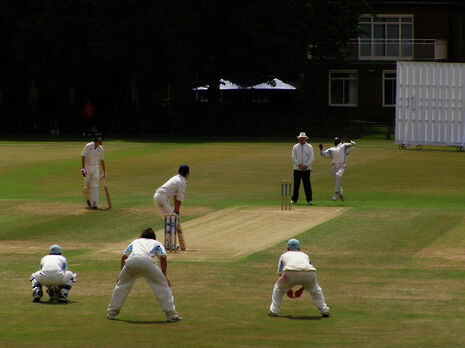Ruel Braithwaite, former Blues cricketer, has signed a professional contract with Durham CCC

It was not for long, but it was a majestic sight: the wicket-keeper and slips beyond the ring; the batsman cowering near square-leg; at the top of his mark, Ruel Brathwaite. A Queens’ engineer and Blue in 2008/9, ‘Brath’ has become the latest Cambridge cricketer to enter the professional game. Last week, he signed a two-year contract with Durham that will see him join Steve Harmison, Liam Plunkett, and Graham Onions in the most potent pace battery in county cricket. This week, he talks to Varsity Sport.
He begins, naturally enough, with his forthcoming north-eastern adventure. “It is definitely exciting. I see [Durham] as a great place to learn, because there is a great wealth of knowledge, experience and success within their fast-bowling fleet. This is possibly a reflection of the quality of coaching there, but I know it will be a challenge, and one that I embrace.”
Not that Brathwaite will forget his cricket at Cambridge. “It was a great experience to play there,” he recalls. “The facilities at Fenner’s are better than at most county second XI grounds. I also got to play with a competitive and highly motivated bunch of lads, and the ardent supporters always made it as warm and as welcoming a place as any to play cricket.”
Those who remain at Fenner’s remember Brathwaite’s time with fondness. As Cambridge coach Chris Scott – himself a former professional with Durham – told Varsity Sport: “It was a massive boost when Ruel decided on a Master’s here. Not only was he a very popular member of the squad who gave everything in matches and training, but to have a bowler of his pace and quality gave our team real credibility against the county sides and helped us to go far in our inter-MCCU and Varsity games.”
Just how far is evident. Though Brathwaite’s 3 for 38 could not prevent defeat at Lord’s, his 8 for 130 in 2009’s four-day Varsity Match was instrumental in Cambridge’s ten-wicket victory, a margin of victory unparalleled in the fixture’s history and something Brathwaite describes as “one of [his] most memorable experiences at Cambridge”.
In spite of those magnificent achievements, Brathwaite’s contribution to University sport was more than a Varsity victory. His Cambridge career has demonstrated that talented sportsmen can embark on a serious academic career without jeopardising their sporting development.
Brathwaite regards Cambridge as crucial to his progress: “The time I spent in pre-season with Chris [Scott] allowed me to fine-tune my skills and to improve my fitness as well. On the field, the first-class allowed me to showcase my abilities against some of the finest cricketers in the country and the world.” The South African Test batsman Jacques Rudolph, dismissed by Brathwaite on his debut for Cambridge, would probably agree.
And what of the problems of balancing work with cricket? “I can’t speak for other cricketers,” Brathwaite answers, “but I find that when it comes to stress cricket and academics have a synergistic relationship. Having a sound academic background complemented the discipline with which I approached my cricket.”
Given that MCC funds cricket at both Cambridge and Loughborough, where Brathwaite completed his undergrad, it is fitting that the venerable club should have the last word here. Garri Jones (Caius, 1989), who chairs MCC’s sub-committee on youth cricket, has only praise for Brathwaite. “As soon as Ruel arrived at Dulwich College,” he commented, “it was clear that he was a talented cricketer. But it soon became clear he was a talented academic as well, and CUCC was delighted when he was offered a place for his MPhil. Top sportsmen who also happen to be bright must have the opportunity to pursue both sport and academia at the highest level.”
And when we next see ‘Brath’ charge in for Durham, we’ll know it can be done.
 News / Fitz students face ‘massive invasion of privacy’ over messy rooms23 April 2024
News / Fitz students face ‘massive invasion of privacy’ over messy rooms23 April 2024 News / Cambridge University disables comments following Passover post backlash 24 April 2024
News / Cambridge University disables comments following Passover post backlash 24 April 2024 Comment / Gown vs town? Local investment plans must remember Cambridge is not just a university24 April 2024
Comment / Gown vs town? Local investment plans must remember Cambridge is not just a university24 April 2024 Comment / Does Lucy Cavendish need a billionaire bailout?22 April 2024
Comment / Does Lucy Cavendish need a billionaire bailout?22 April 2024 Interviews / Gender Agenda on building feminist solidarity in Cambridge24 April 2024
Interviews / Gender Agenda on building feminist solidarity in Cambridge24 April 2024





